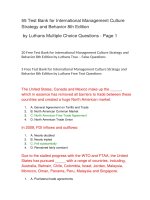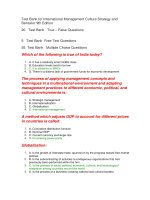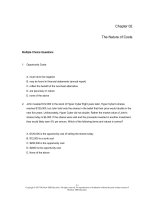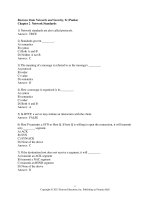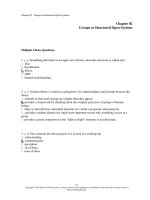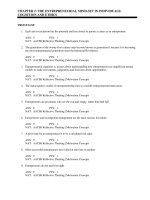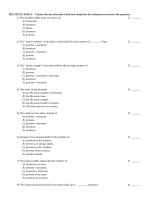International management culture strategy and behavior 9th edition luthans test bank
Bạn đang xem bản rút gọn của tài liệu. Xem và tải ngay bản đầy đủ của tài liệu tại đây (351.55 KB, 59 trang )
Chapter 02
The Political, Legal, and Technological Environment
True / False Questions
1.
The Arab Spring was the first sign of unrest in the Middle East in two centuries.
True
2.
False
As was true with previous rebellions in the region, the Arab Spring led to real reforms at a
deliberate pace.
True
3.
False
Before he was overthrown, Mubarak of Egypt had been one of the most powerful leaders in the
region for 30 years.
True
4.
False
Evidence shows that the initial "Day of Revolt" in Egypt in 2011 was coordinated online through
Twitter.
True
5.
False
Many firms try to work collaboratively with governments as new laws, policies, and regulations are
introduced.
True
False
2-1
Copyright © 2015 McGraw-Hill Education. All rights reserved. No reproduction or distribution without the prior written consent of
McGraw-Hill Education.
6.
The rapid changes in the technological environment of global business is an ongoing challenge for
international managers.
True
7.
False
The domestic and international political environment has a major impact on multinational
corporations.
True
8.
Collectivism emerged in Italy and France as "national socialism."
True
9.
False
False
Great Britain's Labour Party practices "democratic socialism."
True
False
10. According to the text, Russia presents the extreme example of how the political environment
impacts on international management.
True
False
11. Common law is derived from Roman law and is found in the non-Islamic and non-socialist
countries such as France, some countries in Latin America and even Louisiana in the United States.
True
False
12. The doctrine of civility holds that there must be mutual respect for the laws, institutions, and
government of other countries in the manner of jurisdiction over their own citizens.
True
False
13. Under the act of state doctrine, all acts of other governments are considered to be valid by U.S.
courts, even if such acts are inappropriate in the United States.
True
False
2-2
Copyright © 2015 McGraw-Hill Education. All rights reserved. No reproduction or distribution without the prior written consent of
McGraw-Hill Education.
14. The FCPA makes it illegal to influence foreign officials through the granting of favorable tariff
rates.
True
False
15. The objectives of the FCPA were to stop U.S. MNCs from initiating or perpetuating corruption in
foreign governments and to upgrade the image of both the United States and its businesses
abroad.
True
False
16. The current move toward privatization by an increasing number of countries is an example of the
changing international regulatory environment.
True
False
17. Trade agreements do not require that trade benefits accorded to one nation be extended to other
nations that are party to that agreement.
True
False
18. Embedded learning technology will allow thinking to occur in machines.
True
False
19. One reason for the rapid increase in telecommunications services is that many countries believe
that without an efficient communications system, their economic growth may stall.
True
False
20. Technology does not have the potential to displace employees holding positions traditionally
reserved for human thinking.
True
False
2-3
Copyright © 2015 McGraw-Hill Education. All rights reserved. No reproduction or distribution without the prior written consent of
McGraw-Hill Education.
Multiple Choice Questions
21. Which of the following statements is untrue?
A. Social media is an organizing tool.
B. Social media is an unreliable form of journalism.
C. Various groups have used social media to gather support.
D. Social media impacts international business ventures.
22. The Arab Spring began in:
A. Egypt
B. Bahrain
C. Tunisia
D. Syria
23. Northern Africa and the Middle East independent protests that led to government reforms
between 2010 and 2011 did not include this country.
A. Yemen
B. Egypt
C. Libya
D. Iran
24. Social media can positively impact international business by:
A. Facilitating a fast transition to more open trade and business dealings
B. Increasing shipping and logistical costs of goods
C. Limiting the economic effects to the country experiencing unrest
D. Stabilizing fuel costs
2-4
Copyright © 2015 McGraw-Hill Education. All rights reserved. No reproduction or distribution without the prior written consent of
McGraw-Hill Education.
25. In a business context, individualism is synonymous with:
A. Collectivism
B. Socialism
C. Totalitarianism
D. Capitalism
26. Aristotle and David Hume contributed to the principle of:
A. Socialism
B. Collectivism
C. Individualism
D. Communism
27. Which two countries led the effort to mobilize public and private support for Greece in 2010?
A. France and Germany
B. Britain and France
C. Spain and France
D. Germany and Britain
28. One of the biggest impediments to attracting more foreign investment in Russia is:
A. Legal mandates
B. Economic opportunities
C. Political corruption
D. Religious practices
2-5
Copyright © 2015 McGraw-Hill Education. All rights reserved. No reproduction or distribution without the prior written consent of
McGraw-Hill Education.
29. Communism as an economic system has failed due to the tendency of common goals to stunt:
A. Progress and individual creativity
B. Individual productivity
C. Individual freedom
D. Profit and growth
30. Governmental power in a democracy is limited by:
A. The accountability of the elected representatives to the general public
B. Individual freedom-such as freedom of expression and assembly
C. The police force which is independent of the state
D. Limiting the number of terms for which a representative may be elected
31. Political repression and denial of rights and civil liberties are dominant ideals of:
A. Totalitarianism
B. Socialist democracy
C. Collectivism
D. Monarchy
32. The totalitarian form of government is to be seen in:
A. Singapore and Cambodia
B. Germany and Italy
C. Latin America only
D. Vietnam, Cuba, and North Korea
2-6
Copyright © 2015 McGraw-Hill Education. All rights reserved. No reproduction or distribution without the prior written consent of
McGraw-Hill Education.
33. Multinational corporations in China are faced with a multitude of problems except:
A. Government regulations
B. Questionable treatment of foreign firms
C. Market growth opportunities
D. Understanding what is needed from investors, resulting in mixed signals
34. _____ law comes from English law and is the foundation of the legal system in the United States,
Canada, England, Australia, New Zealand, and others.
A. Civil or code
B. Islamic
C. Socialist
D. Common
35. Identify from the following the correct statement on civil law.
A. It comes from English law and is found in nonsocialist countries
B. It is to be found in countries of Central Asia
C. It is derived from Roman law and is found in nonsocialist countries such as France
D. It is the foundation of the legal system in the United States, Canada, England, Australia, New
Zealand and other nations
36. The _____ holds that governments have the right to rule themselves as they see fit.
A. Principle of sovereignty
B. Nationality principle
C. Territoriality principle
D. Protective principle
2-7
Copyright © 2015 McGraw-Hill Education. All rights reserved. No reproduction or distribution without the prior written consent of
McGraw-Hill Education.
37. International law includes the following types of jurisdictional principles:
A. Nationality, territoriality, and protective
B. Territoriality, sovereignty, and nationality
C. Good citizenship, territoriality, and protective
D. Protective, comity, and sovereignty
38. The _____ principle holds that every country has jurisdiction (authority or power) over its citizens no
matter where they are located.
A. Comity
B. Nationality
C. Territoriality
D. Sovereignty
39. The _____ principle holds that every nation has the right of jurisdiction within its legal territory.
A. Sovereignty
B. Protective
C. Territoriality
D. Nationality
40. The _____ principle holds that every country has jurisdiction over behavior that adversely affects its
national security, even if that conduct occurred outside the country.
A. Territoriality
B. Nationality
C. Sovereignty
D. Protective
2-8
Copyright © 2015 McGraw-Hill Education. All rights reserved. No reproduction or distribution without the prior written consent of
McGraw-Hill Education.
41. The _____ holds that there must be mutual respect for the laws, institutions, and the government of
other countries in the matter of jurisdiction over their own citizens.
A. Doctrine of protectionism
B. Doctrine of civility
C. Doctrine of mutual understanding
D. Doctrine of comity
42. U.S. laws require equality in the workplace for all employees. U.S. citizens who take a job in
Germany cannot sue their German employer under the provisions of U.S. law for failure to provide
equal opportunity for them. This is in line with the:
A. Principle of sovereignty
B. Nationality principle
C. Doctrine of comity
D. Act of state doctrine
43. Under the _____, all acts of other governments are considered to be valid by U.S. courts, even if
such acts are inappropriate in the United States.
A. Act of state doctrine
B. Act of international civility
C. Act of judicial sovereignty
D. Act of international understanding
44. Countries have the legal right to refuse admission of foreign citizens and to impose special
restrictions on the following except:
A. Conduct
B. Right of travel
C. Spending
D. What business they may conduct
2-9
Copyright © 2015 McGraw-Hill Education. All rights reserved. No reproduction or distribution without the prior written consent of
McGraw-Hill Education.
45. The statute that makes it illegal to influence foreign officials through personal payment of political
contributions is referred to as the:
A. Fairness in International Affairs Act
B. Foreign Corrupt Practices Act
C. Global Ethics Act
D. Fair Treatment of Foreign Citizens Act
46. Critics of the Foreign Corrupt Practices Act feared the loss of sales to foreign competitors,
especially in those countries where:
A. Customs are adhered to
B. Political stability exists
C. Common law is applicable
D. Bribery is an accepted means
47. It was reported that since the passage of the Foreign Corrupt Practices Act (FCPA):
A. MNCs could not function within the set guidelines
B. Algeria and Saudi Arabia no longer allowed U.S. firms to do business there
C. There was a 30 percent loss of sales to foreign competitors
D. U.S. exports to "bribe prone" countries actually increased
48. Because of the extensive bureaucracy in Japan,
A. Parochial actions create problems for MNCs trying to do business there
B. Political parties feel more beholden to the country as a whole than to their local interests
C. The country's recent Prime Ministers have tried to fix the resulting problems
D. Businesses believe they are well prepared for the harsh competitive realities of the international
marketplace
2-10
Copyright © 2015 McGraw-Hill Education. All rights reserved. No reproduction or distribution without the prior written consent of
McGraw-Hill Education.
49. Out of fear of creating internal political problems for U.S. allies, the U.S. State Department tried to
convince the SEC and Justice Department to _____ the names of countries or foreign officials who
were involved in its investigations of bribery.
A. Not reveal
B. Disclose
C. Charge officials not to reveal
D. Publish in the New York Times
50. U.S. MNCs always assumed that bribes were required to ensure contracts in:
A. India
B. The Middle East
C. Asia Pacific
D. Eastern Europe
51. According to the text, _____ is one of the biggest problems facing MNCs.
A. Fear of investing abroad
B. Loss of sales to foreign competitors
C. Uneven ethical standards
D. Very restrictive foreign bureaucracies
52. Japanese companies are aware that their dependency on the world market for many goods and
services is negatively impacted by _____, resulting in local consumers paying the price.
A. The balance of payments
B. Bureaucratization
C. Trade imbalances
D. Financial exchange
2-11
Copyright © 2015 McGraw-Hill Education. All rights reserved. No reproduction or distribution without the prior written consent of
McGraw-Hill Education.
53. Which country does not rank high on the ease-of-doing-business index?
A. the Philippines
B. Singapore
C. United Kingdom
D. the United States
54. The creation of a digital framework:
A. Made business communication vastly more expensive
B. Made the microprocessor obsolete
C. Allowed high-power computer performance at low cost
D. Required satellites for all forms of communication
55. The term "e-cash" stands for:
A. Easy cash
B. Export cash
C. Electronic cash
D. Exchange cash
56. According to the text, the most popular form of e-business is:
A. B2B dealings
B. B2C dealings
C. Financial dealings
D. E-retailing
2-12
Copyright © 2015 McGraw-Hill Education. All rights reserved. No reproduction or distribution without the prior written consent of
McGraw-Hill Education.
57. The area of e-business that will most affect global customers is:
A. E-marketing
B. E-retailing and financial services
C. Retailing
D. Internet sales
58. The most obvious dimension of the technological environment facing international managers
today is:
A. Telecommunications
B. Transportation
C. Agricultural mechanization
D. Improved service technologies
59. Identify the correct statement on cellular infrastructure.
A. It is expensive to install
B. It is quick and relatively inexpensive to install
C. It is relatively inexpensive to install but takes time
D. It cannot be installed easily and cheaply in rural areas
60. Over the next decade, the merging of the Internet and wireless technology will radically change
the ways in which people:
A. Spend
B. Socialize
C. Communicate
D. Invest
2-13
Copyright © 2015 McGraw-Hill Education. All rights reserved. No reproduction or distribution without the prior written consent of
McGraw-Hill Education.
61. Governments are accepting the belief that the only way to attract foreign investment and knowhow in telecommunications is to:
A. Cede control to private industry
B. Get cheaper service providers
C. Get cheap and efficient labor
D. Get private partners
62. According to the text, NYNEX holds a stake in:
A. Telecom New Zealand
B. Thailand's Telecom Asia
C. Australia's Optus
D. Thailand's Globe Telecom
63. The Hong Kong office of Salomon Brothers, a U.S. investment bank, estimates that to meet the
expanding demand for telecommunication service in Asia, companies will need:
A. Cheaper technology
B. Cheap and efficient labor
C. Considerable increase in investment
D. Cheaper service providers
64. Some observers have noted that technology already has eliminated much and in the future will
eliminate even more of the work now being done by:
A. Top level managers
B. Middle managers and white-collar staff
C. Maintenance workers
D. Line employees and service staff
2-14
Copyright © 2015 McGraw-Hill Education. All rights reserved. No reproduction or distribution without the prior written consent of
McGraw-Hill Education.
65. _____ has placed pressure on MNCs to outsource production.
A. Mounting cost pressure and profit expectations
B. Lack of cheap and expert labor
C. Global and Internal competition
D. Profit expectation by governments
66. Identify the option that would constitute white-collar service industries.
A. Steel and autos
B. Agriculture
C. Insurance only
D. Insurance and banks
67. Emerging information technology has made work:
A. More portable
B. More risky
C. More tedious
D. More complicated
68. MNCs have moved certain production activities overseas to capitalize on:
A. Increasing costs
B. Cheap labor
C. Larger markets
D. Higher purchasing power
2-15
Copyright © 2015 McGraw-Hill Education. All rights reserved. No reproduction or distribution without the prior written consent of
McGraw-Hill Education.
69. Low-paid workers in India and Asian countries now are being given subcontracted work such as:
A. Insurance jobs
B. Auto industry jobs
C. Labor-intensive hardware development
D. Code-writing jobs
70. According to the text, a positive side of the opportunities that technology offers would be:
A. Decline in the cost of doing business worldwide
B. Price rise due to cost of equipment
C. Elimination of higher-priced labor
D. Replacement of employees by machines
Essay Questions
71. What is totalitarianism? Identify its features and forms.
2-16
Copyright © 2015 McGraw-Hill Education. All rights reserved. No reproduction or distribution without the prior written consent of
McGraw-Hill Education.
72. What are the four foundations upon which laws are based around the world? Briefly explain each
foundation.
73. What jurisdictional principles are given by International Law?
74. Describe the Foreign Corrupt Practices Act. What were the objectives of the FCPA?
2-17
Copyright © 2015 McGraw-Hill Education. All rights reserved. No reproduction or distribution without the prior written consent of
McGraw-Hill Education.
75. What is biotechnology? Discuss some of the areas in which it has been used and is likely to be
used.
2-18
Copyright © 2015 McGraw-Hill Education. All rights reserved. No reproduction or distribution without the prior written consent of
McGraw-Hill Education.
Chapter 02 The Political, Legal, and Technological Environment Answer
Key
True / False Questions
1.
The Arab Spring was the first sign of unrest in the Middle East in two centuries.
FALSE
The Bahrain protests occurred in the 1990s, and the Iranian protests took place in 2009.
AACSB: Analytic
Blooms: Remember
Learning Objective: 02-01 INTRODUCE the basic political systems that characterize regions and countries around the world and
offer brief examples of each and their implications for international management.
Level of Difficulty: 1 Easy
Topic: Social Media and the Pace of Change
2.
As was true with previous rebellions in the region, the Arab Spring led to real reforms at a
deliberate pace.
FALSE
Unlike previous rebellions in the region, which were quashed, the Arab Spring led to real
reforms at a pace never before seen in the region.
AACSB: Analytic
Blooms: Remember
Learning Objective: 02-01 INTRODUCE the basic political systems that characterize regions and countries around the world and
offer brief examples of each and their implications for international management.
Level of Difficulty: 2 Medium
Topic: Social Media and the Pace of Change
2-19
Copyright © 2015 McGraw-Hill Education. All rights reserved. No reproduction or distribution without the prior written consent of
McGraw-Hill Education.
3.
Before he was overthrown, Mubarak of Egypt had been one of the most powerful leaders in the
region for 30 years.
TRUE
Egyptian President Hosni Mubarak had a 30-year hold on power.
AACSB: Analytic
Blooms: Remember
Learning Objective: 02-01 INTRODUCE the basic political systems that characterize regions and countries around the world and
offer brief examples of each and their implications for international management.
Level of Difficulty: 2 Medium
Topic: Social Media and the Pace of Change
4.
Evidence shows that the initial "Day of Revolt" in Egypt in 2011 was coordinated online through
Twitter.
FALSE
Evidence shows that the initial "Day of Revolt" was coordinated online through a Facebook
group.
AACSB: Analytic
Blooms: Remember
Learning Objective: 02-01 INTRODUCE the basic political systems that characterize regions and countries around the world and
offer brief examples of each and their implications for international management.
Level of Difficulty: 2 Medium
Topic: Social Media and the Pace of Change
5.
Many firms try to work collaboratively with governments as new laws, policies, and regulations
are introduced.
TRUE
MNCs must collaboratively work with new governments as laws, policies, and regulations are
introduced and altered.
AACSB: Analytic
Blooms: Understand
2-20
Copyright © 2015 McGraw-Hill Education. All rights reserved. No reproduction or distribution without the prior written consent of
McGraw-Hill Education.
Learning Objective: 02-01 INTRODUCE the basic political systems that characterize regions and countries around the world and
offer brief examples of each and their implications for international management.
Level of Difficulty: 3 Hard
Topic: Social Media and the Pace of Change
6.
The rapid changes in the technological environment of global business is an ongoing challenge
for international managers.
TRUE
Managing the political and legal environment will continue to be an important challenge for
international managers, as will the rapid changes in the technological environment of global
business.
AACSB: Analytic
Blooms: Understand
Learning Objective: 02-01 INTRODUCE the basic political systems that characterize regions and countries around the world and
offer brief examples of each and their implications for international management.
Level of Difficulty: 1 Easy
Topic: Social Media and the Pace of Change
7.
The domestic and international political environment has a major impact on multinational
corporations.
TRUE
Both domestic and international political environments have a major impact on MNCs.
AACSB: Analytic
Blooms: Understand
Learning Objective: 02-01 INTRODUCE the basic political systems that characterize regions and countries around the world and
offer brief examples of each and their implications for international management.
Level of Difficulty: 2 Medium
Topic: Political Environment
2-21
Copyright © 2015 McGraw-Hill Education. All rights reserved. No reproduction or distribution without the prior written consent of
McGraw-Hill Education.
8.
Collectivism emerged in Italy and France as "national socialism."
FALSE
Collectivism emerged in Germany and Italy as "national socialism."
AACSB: Analytic
Blooms: Remember
Learning Objective: 02-01 INTRODUCE the basic political systems that characterize regions and countries around the world and
offer brief examples of each and their implications for international management.
Level of Difficulty: 1 Easy
Topic: Political Environment
9.
Great Britain's Labour Party practices "democratic socialism."
TRUE
Socialism has been practiced in a more moderate form—"democratic socialism"—by Great
Britain's Labour Party.
AACSB: Analytic
Blooms: Remember
Learning Objective: 02-01 INTRODUCE the basic political systems that characterize regions and countries around the world and
offer brief examples of each and their implications for international management.
Level of Difficulty: 2 Medium
Topic: Political Environment
10.
According to the text, Russia presents the extreme example of how the political environment
impacts on international management.
TRUE
Russia presents one of the most extreme examples of how the political environment affects
international management.
AACSB: Analytic
Blooms: Remember
Learning Objective: 02-01 INTRODUCE the basic political systems that characterize regions and countries around the world and
offer brief examples of each and their implications for international management.
2-22
Copyright © 2015 McGraw-Hill Education. All rights reserved. No reproduction or distribution without the prior written consent of
McGraw-Hill Education.
Level of Difficulty: 2 Medium
Topic: Political Environment
11.
Common law is derived from Roman law and is found in the non-Islamic and non-socialist
countries such as France, some countries in Latin America and even Louisiana in the United
States.
FALSE
Common law comes from English law, and it is the foundation of the legal system in the United
States, Canada, England, Australia, New Zealand, and other nations.
AACSB: Analytic
Blooms: Remember
Learning Objective: 02-02 PRESENT an overview of the legal and regulatory environment in which MNCs operate worldwide; and
highlight differences in approach to legal and regulatory issues in different jurisdictions.
Level of Difficulty: 2 Medium
Topic: Legal and Regulatory Environment
12.
The doctrine of civility holds that there must be mutual respect for the laws, institutions, and
government of other countries in the manner of jurisdiction over their own citizens.
FALSE
The doctrine of comity holds that there must be mutual respect for the laws, institutions, and
governments of other countries in the matter of jurisdiction over their own citizens.
AACSB: Analytic
Blooms: Remember
Learning Objective: 02-02 PRESENT an overview of the legal and regulatory environment in which MNCs operate worldwide; and
highlight differences in approach to legal and regulatory issues in different jurisdictions.
Level of Difficulty: 2 Medium
Topic: Legal and Regulatory Environment
2-23
Copyright © 2015 McGraw-Hill Education. All rights reserved. No reproduction or distribution without the prior written consent of
McGraw-Hill Education.
13.
Under the act of state doctrine, all acts of other governments are considered to be valid by U.S.
courts, even if such acts are inappropriate in the United States.
TRUE
Under the act of state doctrine, all acts of other governments are considered to be valid by U.S.
courts, even if such acts are inappropriate in the United States.
AACSB: Analytic
Blooms: Remember
Learning Objective: 02-02 PRESENT an overview of the legal and regulatory environment in which MNCs operate worldwide; and
highlight differences in approach to legal and regulatory issues in different jurisdictions.
Level of Difficulty: 2 Medium
Topic: Legal and Regulatory Environment
14.
The FCPA makes it illegal to influence foreign officials through the granting of favorable tariff
rates.
FALSE
The FCPA makes it illegal to influence foreign officials through personal payment or political
contributions.
AACSB: Analytic
Blooms: Remember
Learning Objective: 02-02 PRESENT an overview of the legal and regulatory environment in which MNCs operate worldwide; and
highlight differences in approach to legal and regulatory issues in different jurisdictions.
Level of Difficulty: 1 Easy
Topic: Legal and Regulatory Environment
2-24
Copyright © 2015 McGraw-Hill Education. All rights reserved. No reproduction or distribution without the prior written consent of
McGraw-Hill Education.
15.
The objectives of the FCPA were to stop U.S. MNCs from initiating or perpetuating corruption in
foreign governments and to upgrade the image of both the United States and its businesses
abroad.
TRUE
The objectives of the FCPA were to stop U.S. MNCs from initiating or perpetuating corruption in
foreign governments and to upgrade the image of both the United States and its businesses
abroad.
AACSB: Analytic
Blooms: Remember
Learning Objective: 02-02 PRESENT an overview of the legal and regulatory environment in which MNCs operate worldwide; and
highlight differences in approach to legal and regulatory issues in different jurisdictions.
Level of Difficulty: 2 Medium
Topic: Legal and Regulatory Environment
16.
The current move toward privatization by an increasing number of countries is an example of
the changing international regulatory environment.
TRUE
An example of the changing international regulatory environment is the current move toward
privatization by an increasing number of countries.
AACSB: Analytic
Blooms: Apply
Learning Objective: 02-02 PRESENT an overview of the legal and regulatory environment in which MNCs operate worldwide; and
highlight differences in approach to legal and regulatory issues in different jurisdictions.
Level of Difficulty: 3 Hard
Topic: Legal and Regulatory Environment
2-25
Copyright © 2015 McGraw-Hill Education. All rights reserved. No reproduction or distribution without the prior written consent of
McGraw-Hill Education.
